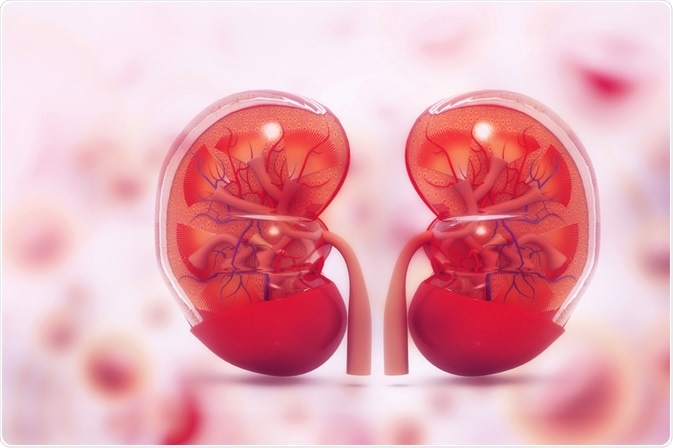In the majority of patients, Henoch-Schönlein purpura (HSP) resolves spontaneously within about 6-8 weeks. In about 40% of cases the kidney shows signs of chronic damage, which may lead to end-stage renal disease requiring dialysis or kidney transplantation in 1%. For this reason, the blood pressure should always be measured, along with a urinalysis test for hematuria, and/or proteinuria.

crystal light | Shutterstock
Treatment is mostly symptomatic and the rash is usually the last manifestation to subside. This is especially so in very active children, in whom it may even appear to increase in severity.
Non-steroidal analgesics and anti-inflammatory drugs (NSAIDs)
Drugs such as aspirin or ibuprofen are used to relieve mild joint pain or fever. Aspirin should not be administered in pediatric patient because of the risk of Reye’s syndrome. NSAIDs should be avoided in patients with renal involvement or gastrointestinal symptoms because they may aggravate the severity of the symptoms.
Corticosteroids
Corticosteroids such as prednisone are useful in preventing the exacerbation of purpura soon after diagnosis, and in relieving the intensity as well as duration of joint pain. These drugs not only act to relieve inflammation but reduce immune activation, lowering some aspects of disease activity. Bed rest should also be prescribed.
They are also useful in reducing the severity of abdominal pain as well as its duration when given in somewhat higher doses than normally used. Abdominal pain is reported to be relieved in 24 hours of administration.
Corticosteroids have also been studied as to their role in severe glomerulonephritis caused by HSP in children. However, they have not been shown to reduce the extent or severity of renal involvement, nor did they prevent the development of renal damage. Despite their effectiveness in cutting short the period of abdominal pain, they do not reduce the incidence of abdominal surgery, though the number of gastrointestinal endoscopies and imaging of the digestive tract was generally less.
Corticosteroids do not bring down the rate of recurrence of HSP.
Immunosuppressive drugs
The role of immunosuppressants is limited to adults with severe HSP-related renal failure of acute onset. Cyclophosphamide is most often used. These drugs prevent the proliferation, activation and antibody production of immune cells.
Anti-hypertensive agents
People who have elevated blood pressure as a result of HSP require its careful control. The drugs most often used include angiotensinogen-converting enzyme (ACE) inhibitors, or angiotensin receptor blockers (ARBs) which not only lower the hypertension but limit renal damage by reducing the activity of the renin-angiotensin axis.
In addition, other drugs may be required to control the blood pressure. These include diuretics, beta-blockers, or calcium-channel blockers.
Surgical consultation may be needed if there is testicular pain or swelling – this is to rule out the rare but serious complication of testicular torsion, which requires emergency untwisting.
Follow-up
Patients need to have a follow-up urinalysis performed at weekly intervals at first, and then progressively further apart. These tests should be continued for at least 6 months after the initial episode of HSP to detect any persistent or progressive renal damage.
Symptoms of recurrence should be reported to the healthcare provider immediately. These include:
- Hematuria
- Blood-staining of stools
- Arthralgia or arthritis
- Severe abdominal pain
- Testicular pain or edema
Further Reading
Last Updated: Jan 2, 2023